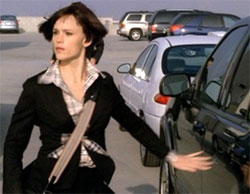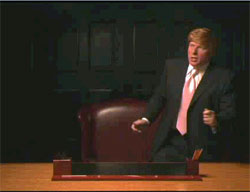November 14, 2005
FeatureProduct Placement or Product Invasion?
Reality TelevisionÍs dirty advertising secret
Beloved and intelligent readers of SMRT-TV, I have an important and shocking announcement: Reality Television is scripted! To what degree depends on the show, but all of your favorite — and not-so-favorite — reality shows employ writers. "Reality Writers" they call us. Yes, "us." For you see, I am a writer in the field of reality television. I am of one of those who tirelessly extract an actual story (admittedly, a novel concept for some reality shows) from thousands of hours of footage, fish for interesting interview bytes that can be clipped together to serve the story, and work in conjunction with editors to make sure the narrative is adhered to and the characters are defined.
| In essence, on the totem poll of writers, television executives and studios regard us as the doormat, hovering ever-so-slightly above letters to Penthouse and internet slash fiction. |
With minuscule production costs and such a fantastically astounding profit margin, itÍs a wonder why the writers and editors — the creative engineers of these shows — are not provided fair compensation. Perhaps it is the respect factor. Strike that — It is definitely the respect factor. Languishing in a field of non-union programming has given us a sense of being replaceable and the powers that be exploit that. The networks and execs have their money, but, you know, they could always have more. They seek it via advertising and marketing their brand name into a franchise. And thatÍs a great thing. God bless capitalism, I say! ItÍs brilliant. However, when advertising for a show interferes with itÍs content? That is a problem.
 "This car is good for escaping my enemies... but is it Ford good?" |
But let me ask you, who is it, do you think, that is responsible for incorporating these infomercials which champion and slobber over any given product while trying their best not to compromise the storyline? Yeah. Over here, friends. ThatÍs a writerÍs job. And no, of course we donÍt see a penny of that free ad revenue. Take any episode of The Apprentice and tell me that something isnÍt rotten in the state of Denmark? You have to wonder if the term "product placement" is a bit outdated and should be replaced by "product invasion." In fact, there is a website dedicated to spreading that very term: www.productinvasion.com. Here, for your glorious eyes, is the websiteÍs mission statement, echoing the sentiment of every writer and editor in reality television.
Product Invasion is the brainchild of some very sleep-deprived writers and Writers Guild of America, west staff. Some of us work as reality writers and editors (yes, those shows really are written), and we know first-hand how the story gets short-changed every time a reality show gets taken over by an advertiser. WeÍre the ones forced to put in long hours just to figure out how weÍre going to embed that can of soda into the storyline eight more times before the final episode.
Some of us are members of the WGA, and we donÍt think advertising and network executivesÍ desire to cash in on the emotional connections viewers have with their favorite show should go unchecked. Together, weÍre also working to make sure reality editors and writers get the respect and recognition they deserve. Since this is our website, weÍre going to make our own plug: Let those sneaky advertisers know youÍre onto them!
| Gone are the days when a reality show contestant/cast member/participant/what have you just happens to be drinking a can of Pepsi. Long gone. Sadly, youÍre more likely now to hear a reality personality tout, in scene, the virtues of drinking Pepsi and how delicious it tastes. |
These indiscretions are magnified when you learn of how writers labored to make them work and maintain some semblance of story flow. Heaven forbid the personalities on the shows speak ill of the product or use it "inappropriately." It would be oh so criminal if the host didnÍt deliver the productÍs tagline exactly as written. We wouldnÍt want that, now, would we? LetÍs go behind the scenes, shall we, and get a taste of exactly how frustrating this product invasion is. These testimonials are 100% real.
Story Producer, AmericaÍs Next Top Model 4
On an episode of Top Model the girls were going to do a runway fashion show. Kmart became a sponsor, so the producers decided that the runway challenge would take place at Kmart.Obviously, when you think of a high fashion runway show the last place you think of is Kmart, and the girlsÍ bites in the original cut reflected that sentiment. It was funny and on point, but because Kmart was a big sponsor, the scene needed to be re-cut. A voice-over was added from Jay Alexander about all the wonderful accessories that you can find at Kmart, a shameless plug and justification for the location.
For that episode, "the talent" had to come back in and read lines they had written about Kmart because Kmart only allowed comments like, "What are we doing at Kmart?" if it was followed up by "ThatÍs OK, I shop here all the time."
Story Producer, Battle of the Sexes II
Verizon Wireless was a sponsor on Battle of the Sexes II and we had to show their product being used and enjoyed by the cast on camera — a lot. In one event, the game consisted of two Verizon phones frozen in two blocks of ice the size and shape of coffins. The Road Rulers and Real Worlders had to get the phones out without using any tools. The boys decided that the best strategy was to stack one teammate on top of the other and slide back and forth very suggestively, allowing their combined body heat to melt the ice. The girls grinded away on their ice just as vigorously. It was a very funny bit, but Verizon rejected contestant sound bites that referred to "gay porn" and other sexual comments. Granted, the ice grinding stayed, but because Verizon executives got final say, we had substitute different interview bites in for the ones they didnÍt approve.Story Producer, Simple Life
Greyhound just gave notes on Simple Life: Interns and demanded that we pull a scene because we portrayed a skidding bus for merely comedic effect.Story Producer, Real World/Road Rules Challenge
T-Mobile paid to get them to say, "I just got a message on my T-Mobile."And if they didnÍt say it right, he would ask them to say it again. Or beforehand, he might say, "OK itÍs coming up — get ready." The cast was also less than moved by some of the prizes, so we would make them shoot it over, and tell them they had to act more enthusiastic about their prizes.
Story Producer, The Swan
Jenny Craig was a major sponsor of the show, so the women were all supposed to be eating Jenny Craig packaged food. But, since the food is near crap nutritionally, the trainers didnÍt want them to eat it. We had to pretend like the women were all still eating Jenny Craig food, even though they werenÍt.
It is clear to see that the line between entertainment and advertising has not just been blurred, itÍs been pissed on and then buried. For advertisers to have the power to control and manage content within programming — no matter how inane a particular show may be — is a dangerous practice that cannot remain unnoticed. I hate to invoke Orwellian imagery, but who knows how troubled the road weÍre heading down will become if advertisers are not held accountable for their manipulation. I urge you all to speak your mind and voice your displeasure with the sneaky, under-handed practices employed by TV executives and advertisers.
 |
I realize the irony of pimping out www.productinvasion.com while at the same time chastising reality shows for shameless infomercialism. But the inherent difference is that 1) IÍm not getting paid nor am I being forced to write this article and 2) this article is actually about www.productinvasion.com. Conversely, I donÍt believe youÍll ever come across a reality show specifically about Home Depot, Crest toothpaste, or El Pollo Loco. Ever.
Email the author.
Return to Season 2, Episode 5.
All written content © 2005 by the authors. For more information, contact homer@smrt-tv.com
